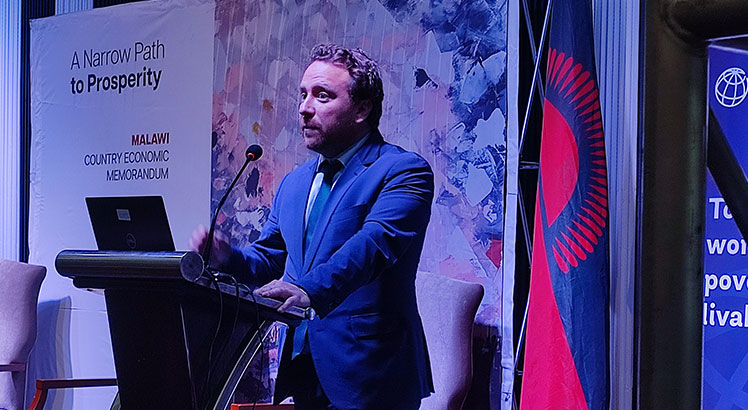World Bank guides on macro economic stability
The World Bank has advised Malawi to stay the course and sustain reforms after a long history of fiscal mismanagement and poor exchange rate management to achieve macro-economic stability.
In its 2023 issue of the Country Economic Memorandum on Malawi issued in Lilongwe yesterday, the bank observed that a series of bad macroeconomic policies and the country’s propensity to external shocks contributed to the web of crises that have stifled growth.
Presenting the report findings, World Bank senior economist for Malawi Jacob Engel said the country’s preference for a fixed exchange rate regime worsened the impact of the foreign exchange deficits created by trade imbalances by introducing market distortions.
“The overvalued exchange rate in the past year disincentivised exporters and created the conditions for a parallel market for forex to thrive and encouraged smuggling,” he said.
However, the bank observed that there is a “narrow path” to stability if local authorities stay the course on the bold reforms the country has implemented to revamp the economy.

The report further notes that the country’s export base has declined, relative to imports.
Figures from the Reserve Bank of Malawi (RBM) show that Malawi closed the third quarter of 2023 with a trade deficit of about $1.7 trillion.
The low level of exports coupled with high import demand have created severe pressure on the country’s forex reserves which has limited firms’ capacity to secure raw materials and resulted in the country miss out on the productivity gains associated with exporting.
The report further shows that the country has a relatively low saving and investment rate at 12.2 percent, barely half the regional norm of 22.3 percent, making the country the seventh-lowest investment rate globally.
The report also notes that the country’s slow transition from smallholder farming and its vulnerability to climate-related shocks have also undermined its prospects for economic growth.
To mitigate the challenges, the bank has urged the country to maintain a market-determined exchange rate and ensure that there is more investment to the agricultural sector, among other remedial measures, to consolidate the gains made by the reforms.
In his address, Minister of Finance and Economic Affairs Simplex Chithyola-Banda said the memorandum will provide the government with a roadmap to build on the reforms undertaken to foster recovery.
Minister of Trade and Industry Sosten Gwengwe said the country will have to prioritise trade and investment to boost economic growth.
“We should prioritise investment in production in reliable and profitable value chains and trade. That is the best way to generate forex and create jobs for the economy,” he said.
During a plenary discussion, Standard Bank Malawi plc chief executive officer Phillip Madinga said the banking and financial sector should focus on ensuring private sector financing to unlock its potential as an “engine for economic growth”.
He said: “We should start lending more to the consumer and move away from our heavy dependence on government securities.
On exchange rate management, University of Malawi associate professor of economics Winford Masanjala urged the government to maintain a market-based exchange rate regime to ensure that the gains from the recent devaluation and subsequent floatation of the kwacha persist.





